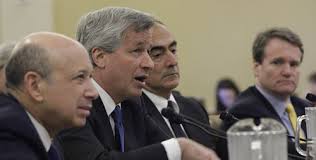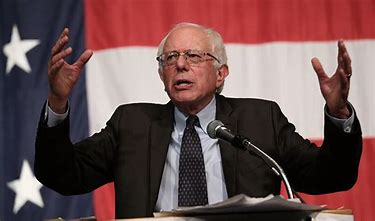One indicator that the Democratic Party is very tepid about making the needed changes to the current broken political, economic, health care and judicial systems has now come directly from former President Barak Obama.
In a Nov. 17, 2019 speech before wealthy donors in Washington DC, Obama warned that certain candidates who have “left-leaning” proposals are out of step with the US electorate. He cautioned the “activist wing” about going “too far left.”
Obama said that the average American wants improvement, not a revolution.
“This is still a country that is less revolutionary than it is interested in improvement. They like seeing things improved, but the average American doesn’t think you have to completely tear down the system and remake it,” he said. “I think it is important for us not to lose sight of that.”

This is the corporate Obama speaking in 2019. The candidate Obama in 2008, who positioned himself as a former community organizer now proposing new ideas on health care, for example, who flirted with carrying the progressive mantle, and then ran with the bold slogan in 2008 “Yes, we can.”
But then something changed. It now looks like Obama has gone full corporate Democrat and has forgotten the messages got him elected.
Obama: The Corporate Democrat
Obama, like his Vice President Joe Biden and Attorney General Eric Holder, have all been corporatists during the time they served in office. They are part of the party that considers itself “liberals” or “establishment” Democrats” and are distinct from “populists” or “left-wingers.”
When he was 45-years-old and a presidential candidate in his first run for the presidency in 2008, Obama stressed the need for serious change and said he was a member of a “different generation” of politicians. He also said the U.S. had suffered from “small-minded,” “24-hour, slash-and-burn” politics, which curtailed progress and hurt the country.
Obama was correct. Corporate-preferred political and economic policies had dominated all legislative and regulatory legislation under both Republicans and the pro-corporate, anti-regulatory policies of Democrat Bill Clinton.
But history gave Obama some tremendous opportunities to change this. He could correct deficiencies in America’s liberal political structure, such as income inequality, foreign policy, climate change, and justice reform. He moved on some of these things, but the Republican Congress worked against him almost his entire term, so he lacked any legislative engine to change policies.

Still, Obama had one prescient moment to change the financial system that brought on the seminal 2008 housing crash and resulting recession. But when it came to making a historic decision that would have cemented his legacy, he failed miserably.
As described in the book “Confidence Men: Wall Street, Washington, and the Education of a President” (2011), Pulitzer Prize-winning author Ron Suskind told a remarkable story from March of 2009 meeting between Obama and his staff and the nation’s bankers. Suskind writes:
“Having ridden into office partly on a wave of popular anger at the economic power elite’s staggering malfeasance, Obama called a meeting of the nation’s top 13 financial executives at the White House. The banking titans came into the gathering full of dread, only to leave pleased to learn that the new president was in their camp. Instead of standing up for those who had been harmed most by the crisis—workers, minorities and the poor—Obama sided unequivocally with those who had caused the meltdown.
“My administration is the only thing between you and the pitchforks,” Obama said. “You guys have an acute public relations problem that’s turning into a political problem. And I want to help. … I’m not here to go after you. I’m protecting you … I’m going to shield you from congressional and public anger.”
“For the banking elite, who had destroyed untold millions of jobs, there was”, as Suskind put it, “nothing to worry about. Whereas [President Franklin Delano] Roosevelt had [during the Great Depression] pushed for tough, viciously opposed reforms of Wall Street and famously said, ‘I welcome their hate,’ Obama was saying, ‘How can I help?’”
“The sense of everyone after the meeting,” one leading banker told Suskind, “was relief. The president had us at a moment of real vulnerability. At that point, he could have ordered us to do just about anything, and we would have rolled over. But he didn’t—he mostly wanted to help us out, to quell the mob.”
Obama’s great mistake here was that he considered the banking crisis propelled by investment and housing fraud a “public relations problem.” As he had before with the rabid Tea Party Republicans who opposed him as early as 2010, Obama thought he could make friends with those who hated him. He was very naïve.
Only about a year after he was elected, Obama worked to befriend the bankers in the room. At the same time, he screwed the American public who wanted justice for those who had personally made millions in profits, just as they dumped their losses on American taxpayers and walked away without any penalties at all. Based on his actions, Obama thought this arrangement was tolerable.
So, as a thought experiment, let’s imagine what the national political system would look like today if Obama had the courage to prosecute the bankers, derivatives salespeople and mortgage officials responsible for the 2008 recession. If Obama, or his timid corporate lawyer Attorney General Eric Holder, did prosecute anyone, my bet is that a Democrat would easily have been elected in 2016. Voters would have seen that Democrats stood for economic and criminal justice.
Instead, Obama made the Democrats synonymous with supporting or allowing corporate malfeasance. Bernie Sander’s authentic populist message became muddled in the anti-socialist rhetoric, and Trump fooled voters into thinking he had a modicum of “populist” principles or any principles at all.
This only begins to explain why Americans feel betrayed by their leaders and why there is no political imagination among traditional liberal Democrats. Incrementalism got the nation to where it is today: a plutocracy run by corporations, big money, and anti-democratic forces.
Obama’s warning will make sure these things do not change.











